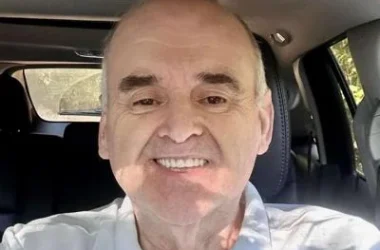
Jim Rubenstein
CHARLESTON, W.Va. — For at least four years, West Virginia Corrections Commissioner Jim Rubenstein had the use of a rent-free garage apartment provided by a state prison subcontractor, according to an investigative report.
Rubenstein recently signed a deal with Kanawha County Prosecuting Attorney Charles Miller’s office to refer the investigation to the state Ethics Commission. In exchange, Miller’s office agreed to end a criminal investigation into Rubenstein’s use of the Kanawha Boulevard apartment.
Rubenstein also has agreed to reimburse the apartment’s owner for back rent.
Terrence Rusin, president and CEO of PsiMed, gave Rubenstein the go-ahead to use the apartment in 2011, according to the report. PsiMed provides mental health services to the state prison system that Rubenstein oversees. The company received more than $7.5 million in state funds during the years Rubenstein had use of the apartment.
Rubenstein also has agreed to repay the state for a $138 hotel bill at the Charleston Four Points Sheraton. Rubenstein charged the state for the hotel stay on Feb. 9, 2015, after the pipes in his rent-free apartment froze up that day.
As part of his deal with Kanawha prosecutors, Rubenstein must cooperate with the Ethics Commission’s investigation and negotiate a “conciliation agreement,” which typically includes a reprimand and fine.
The Gazette-Mail obtained documents related to the investigation after filing a state Freedom of Information Act request.
Rubenstein’s lawyer, Carte Goodwin, declined to comment Monday.
During meetings with investigators, Rubenstein asserted that he moved into the garage apartment around February 2013 and moved out in October or November that year. Rubenstein told investigators that he had stayed at the apartment “once or twice” since late 2013, according to the investigative report.
Investigators determined, however, that Rubenstein had use of the free apartment from February 2011 to July 2015, citing interviews with witnesses and Rubenstein’s cable television bills.
Rubenstein claimed he had a deal with Rusin to furnish the apartment and use the furniture’s value to offset rent payments. Rubenstein provided receipts to investigators that showed he had paid about $3,600 for furniture for the apartment. He promised to leave the furniture behind when he vacated the apartment.
In interviews with investigators last December, Rubenstein acknowledged that he still had a key and access to the apartment — and no one else was living there.
Taking into account the $3,600 Rubenstein paid for furniture, he had use of the apartment for the equivalent of $75 per month over four years, investigators concluded. Similar apartments near the state Capitol Complex cost $350 to $795 a month, according to the report.
Rubenstein and Rusin are longtime friends, according to the report. The two serve as officers for the West Virginia Corrections Training Foundation, a nonprofit group.
The state Legislative Auditor received a tip about Rubenstein’s rent-free apartment and hotel stay during an audit last year.
Rubenstein submitted the $138 bill for reimbursement, but withdrew the request after an executive secretary with the Department of Military Affairs and Public Safety questioned the expense.
Days later, Rubenstein had his deputy commissioner approve the reimbursement, and the state paid him for the hotel stay.
Rubenstein, who has overseen day-to-day operations of state prisons since 2001, has a house in St. Marys, about 100 miles from Charleston.
The West Virginia Legislature’s Commission on Special Investigations started looking into Rubenstein’s rent-free apartment and hotel stay in April 2015.
State ethics laws prohibit public officials from receiving gifts from state contractors and submitting travel expenses under “false pretenses.” The Ethics Commission inquiry is ongoing.
Rusin did not respond to a request for comment on the Rubenstein investigation Monday. A spokesman for the Department of Military Affairs, which oversees the Division of Corrections, would not comment.
Reach Eric Eyre at [email protected], 304-348-4869 or follow @ericeyre on Twitter.






